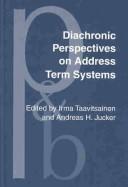| Listing 1 - 3 of 3 |
Sort by
|
Book
ISBN: 9780521870627 0521870623 9780511576690 9780521182379 9780511518058 0511518056 0511576692 1107197562 1282104004 9786612104008 0511517564 0511515707 0511514514 0511516983 0521182379 Year: 2009 Publisher: Cambridge New York Melbourne : Cambridge University Press,
Abstract | Keywords | Export | Availability | Bookmark
 Loading...
Loading...Choose an application
- Reference Manager
- EndNote
- RefWorks (Direct export to RefWorks)
The way in which people address one another is crucial to expressing social relationships and is closely linked with cultural values. In English we call some people by their first names, and others 'Mr' or 'Ms', followed by their surname. In some other languages there are different ways of saying 'you' depending on the degree of social distance. Exploring practices in the family, school, university, the workplace and in letters, this book reveals patterns in the varied ways people choose to address one another, from pronouns to first names, from honorifics to titles and last names. Examples are taken from contemporary English, French, German and Swedish, using rich data from focus group research, interviews, chat groups, and participant observation.
Grammar --- Sociolinguistics --- Forms of address. --- Politeness (Linguistics) --- Grammar, Comparative and general --- Honorific. --- Pronoun. --- Politeness (Linguistics). --- Pronouns --- Honorific --- Courtesy (Linguistics) --- Linguistics --- Address, Forms of --- Address, Titles of --- Titles of address --- Letter writing --- Salutations --- Titles of honor and nobility --- Function words --- Nominals --- Reflexives --- Polite form --- Arts and Humanities --- Language & Linguistics --- Philology --- Grammar, Comparative and general Honorific --- Formes allocutoires --- Énonciation (linguistique) --- Pragmatique --- Grammaire comparée --- Pronoms --- Énonciation (linguistique) --- Grammaire comparée
Book
ISBN: 9782847883589 2847883584 2847886265 Year: 2012 Publisher: Lyon : ENS Éditions,
Abstract | Keywords | Export | Availability | Bookmark
 Loading...
Loading...Choose an application
- Reference Manager
- EndNote
- RefWorks (Direct export to RefWorks)
La sémantique linguistique, après avoir été le parent pauvre de la linguistique, et souvent reléguée au rang d'ornement de la syntaxe, commence à se constituer en discipline autonome. La pertinence de certains concepts est largement reconnue, les méthodes s'affinent et se généralisent, des résultats surgissent et sont acceptés par tous. Cette évolution est due à plusieurs facteurs. Le premier et le plus important réside dans le choix de considérer la sémantique comme une composante autonome de la description linguistique : interdépendante certes avec d'autres composantes, mais non plus à la remorque d'une syntaxe régnant en maître absolu, et imposant sa loi, comme le voulait le modèle morrissien qui a longtemps dominé en linguistique. Par ailleurs, l'apparition en sémantique de cette partie de la pragmatique comprise dans le noyau sémantique fondamental (ce qu'on appelle la pragmatique intégrée) a réintégré les phénomènes énonciatifs dans la sémantique. Et ce, au travers de diverses théories comme les actes de langage ou les études sur le discours rapporté. Enfin, la tendance à s'éloigner du niveau de surface pour élaborer un niveau profond, en favorisant l'apparition de sémantiques de type instructionnel, permet de dépasser le niveau strict de la phrase, pour s'intéresser éventuellement à l'articulation interphrastique. On trouvera traités dans ce volume quelques grands thèmes de la sémantique contemporaine : l'organisation des relations interphrastiques par marqueurs et connecteurs, les phénomènes de discours rapporté et de polyphonie, les divers rôles mis en scène dans cette comédie qu'est la parole, et les contenus qui s'articulent autour de ces notions, comme le savoir commun lié aux doxas et dont une partie transparaît dans le fonds parémiologique.
Discourse markers --- Voice --- Pragmatics --- Marqueurs discursifs --- Énonciation (linguistique) --- Languages & Literatures --- Philology & Linguistics --- Speaking --- Human sounds --- Language and languages --- Music --- Throat --- Diaphragm --- Elocution --- Larynx --- Speech --- Discourse connectives --- Discourse particles --- Pragmatic markers --- Pragmatic particles --- Discourse analysis --- Physiological aspects --- Marqueurs discursifs. --- Discourse markers - Congresses --- Voice - Congresses --- Pragmatics - Congresses --- Énonciation (linguistique) --- General semantics --- Logic, Symbolic and mathematical --- Semantics (Philosophy) --- Philosophy --- marqueurs discursifs --- relation interphrasique --- sémantique --- discours --- polyphonie --- linguistique

ISBN: 902725348X 1588113108 9781588113108 1282255428 9027296677 1423766504 9786612255427 9781423766506 9789027253484 Year: 2003 Publisher: Amsterdam : John Benjamins,
Abstract | Keywords | Export | Availability | Bookmark
 Loading...
Loading...Choose an application
- Reference Manager
- EndNote
- RefWorks (Direct export to RefWorks)
Address term systems and their diachronic developments are discussed in a wide range of European languages in this volume. Most chapters focus on pronominal systems, and in particular on the criteria that govern the choices between a more intimate and a more distant or polite pronoun, as for instance thou and you in Early Modern English, vos and vuestra merced in sixteenth century Spanish or du and Sie in Modern German. Several contributions deal with situations in which more than two terms can be used and several also note co-occurrence patterns of pronominal and nominal forms of address. The volume provides a multivaried picture of the evolutionary lines of address term systems and a representative range of current approaches from pragmatics and sociolinguistics to conversation analysis. It is thus a timely contribution to the rapidly expanding field of historical pragmatics.
Historical linguistics --- Pragmatics --- 800 <09> --- 800 <09> Taalwetenschap. Taalkunde. Linguistiek--Geschiedenis van ... --- Taalwetenschap. Taalkunde. Linguistiek--Geschiedenis van ... --- Forms of address --- Diachronic linguistics --- Dynamic linguistics --- Evolutionary linguistics --- Language and languages --- Language and history --- Linguistics --- Address, Forms of --- Address, Titles of --- Titles of address --- Letter writing --- Salutations --- Titles of honor and nobility --- Taalwetenschap. Taalkunde. Linguistiek--Geschiedenis van .. --- History --- Taalwetenschap. Taalkunde. Linguistiek--Geschiedenis van --- Forms of address. --- Historical linguistics. --- Linguistique historique --- Énonciation (linguistique) --- Formes allocutoires --- Énonciation (linguistique)
| Listing 1 - 3 of 3 |
Sort by
|

 Search
Search Feedback
Feedback About UniCat
About UniCat  Help
Help News
News